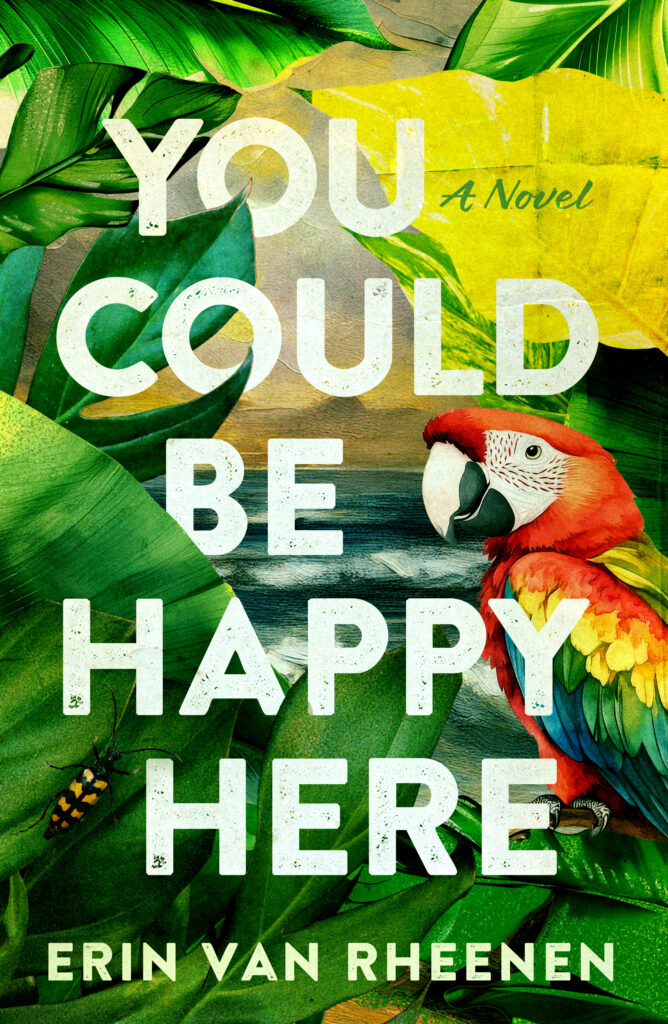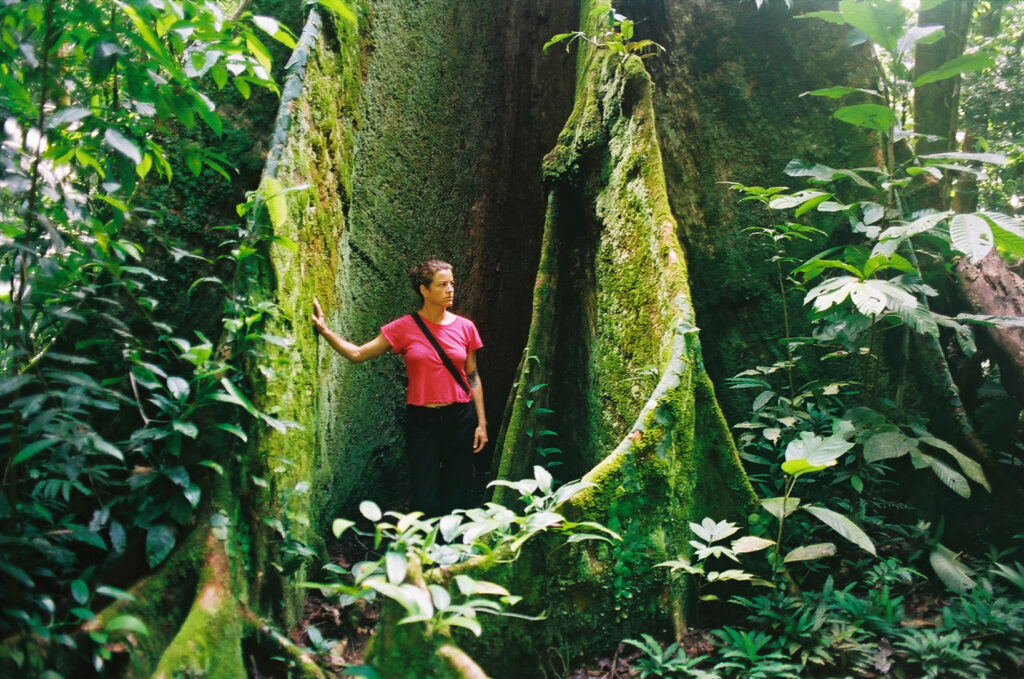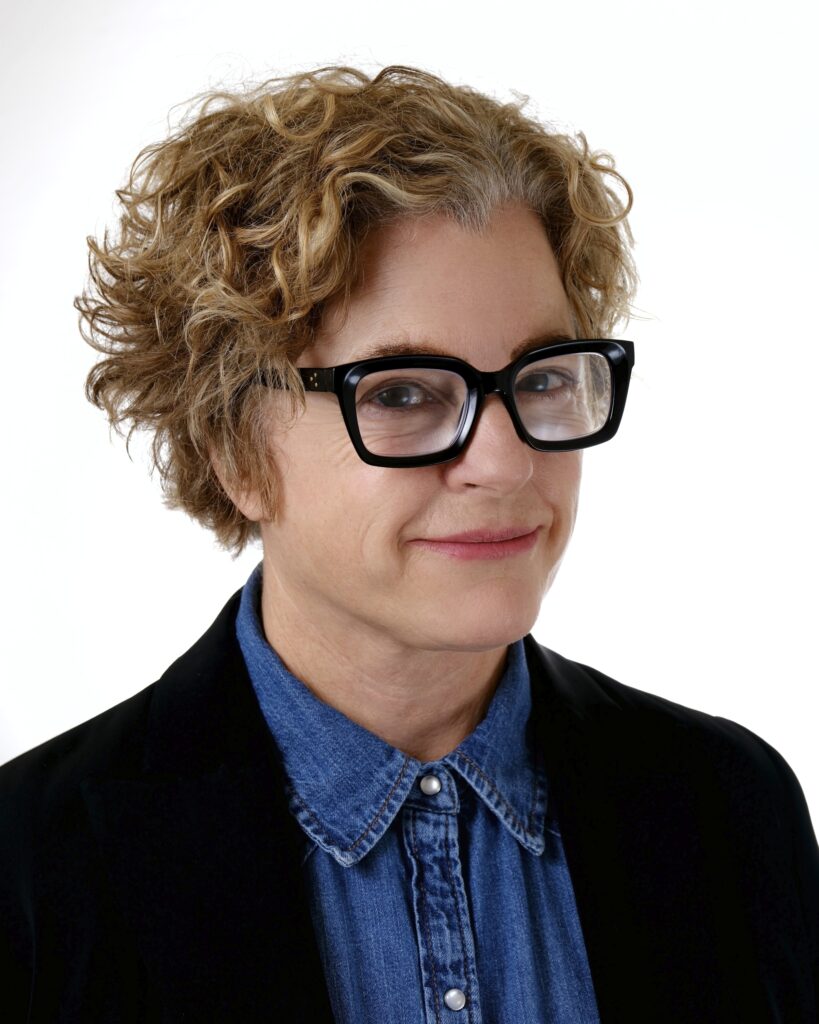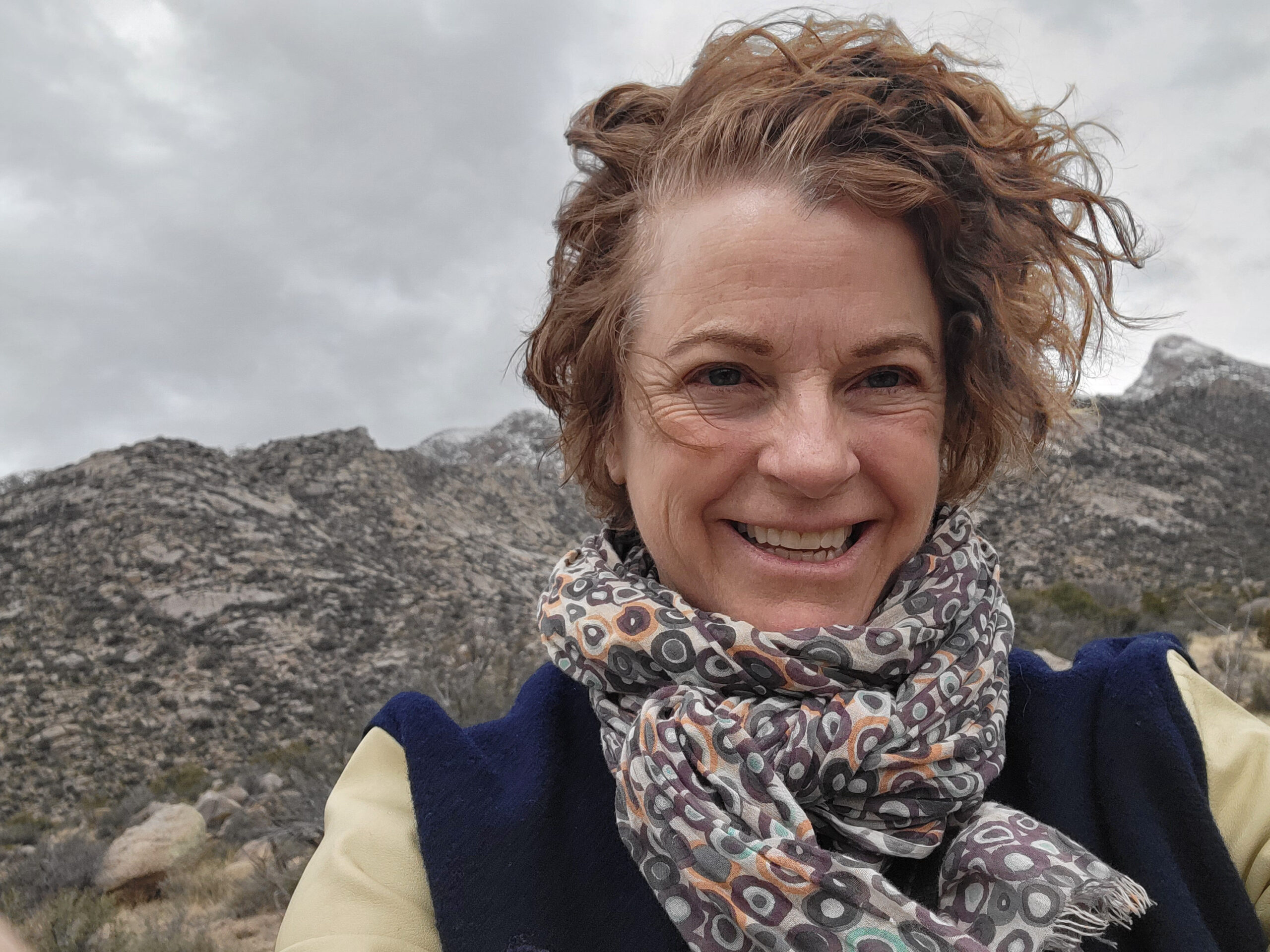BOOK CLUBS
I would be delighted to join your book club, either in person or virtually! If you’d like me to participate, simply send over the details using the form on this page—when you meet, your time zone, and the number of members in your group. I can’t wait to meet you.
In the meantime, check out the Readers Guide for You Could Be Happy Here.
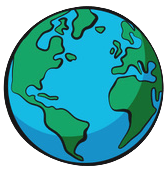
What To Read Where
Subscribe to my Substack newsletter for place-based reading recommendations!
MEDIA KIT
About Erin Van Rheenen
Short Bio
Erin Van Rheenen writes fiction and nonfiction that explores family dynamics, cultural difference, and the power of place. You Could Be Happy Here is her first novel.
Medium Bio
Erin Van Rheenen is a science, travel, and fiction writer with work in publications like BBC Travel, Bellevue Literary Review, and Best Women’s Travel Writing. After earning a BA from UC Santa Cruz and a Masters from City College of New York, she left the US to see the world. She ended up in Costa Rica, where she lived for several years, soaking up the green and researching her relocation guide, Living Abroad in Costa Rica and her children’s book, The Manatee’s Big Day. For ten years she was Senior Writer at The Exploratorium, a science museum. Erin now lives in San Francisco.
Long Bio
Erin Van Rheenen, MA, writes fiction and nonfiction that explores family dynamics, cultural difference, and the power of place. Her work has been anthologized and published in Bellevue Literary Review, Atlas Obscura, BBC Travel, Fiction, The Sun, and Best Women’s Travel Writing. She won the Pirates Alley Faulkner Society prize for best novel in manuscript, judged by novelist Oscar Hijuelos. Her work has been supported by Cottages at Hedgebrook, Community of Writers, and Hippocamp.
You Could Be Happy Here is inspired by Erin’s connection to Latin America. Born in Oregon, schooled in Santa Cruz and New York City, her passion for place really took hold in the Southern reaches of the Americas. She learned Spanish as a child in Guatemala, lived for years as an adult in Ecuador and Mexico, and was married to a Mexico City artist. After they divorced, she moved to Costa Rica, where she lived and traveled by herself while researching her best-selling relocation guide, Living Abroad in Costa Rica (Avalon Travel Publishing). She has contributed to many travel and live-abroad guides, and has been interviewed on radio and television as an expert on Costa Rica and relocating abroad.
Erin was drawn to Costa Rica for its commitment to conservation and its remarkable biodiversity, which inspired her to write a bilingual children’s book, The Manatee’s Big Day. Although she very much enjoyed writing her relocation guide and her children’s book, Erin says that You Could Be Happy Here allows her to tell a different—perhaps deeper—story of a remarkable place.
The list of other jobs she’s endured over the years includes stall mucker, waitress, art mover, aerobics teacher, and unskilled laborer. Erin has also worked as a staff writer at many mission-driven nonprofits, including ten years as Senior Writer at a science museum, The Exploratorium. She has taught writing in universities, high schools, and a women’s jail. Erin now lives in San Francisco, where she writes in cafes and birds in the parks.
About You Could Be Happy Here: A Novel
Basic Book Information
- Genre: Upmarket fiction
- Subgenres/keywords: Costa Rica, adventure, women traveling solo, expats, inheritance, family, grief, ecology, birds, insects
- Publication date: September 16, 2025
- Publisher: Sibylline Press
- ISBN-13: 978-1960573421
- Price: Paperback: $20; ebook: $9.99
- Page Count: 260 pages
Short Book Description
After her mother dies, a California woman travels to Costa Rica to find her estranged father.
Medium Book Description
When Lucy loses her mother and discovers her biological father may be a man from her childhood summers in Costa Rica, she sets out to find him—and herself. But the town she returns to is no longer the paradise she remembers, and her search raises more questions than it answers. You Could Be Happy Here is a story of identity, belonging, and of opening your heart to a deeper understanding of kinship and home.
Long Book Description
Lucy—single, childless, in her thirties—studies insects and ecosystems, in part to make sense of human behavior. That hard-won insight is shattered when her mother dies prematurely, her sister claims the California family home, and Lucy learns that her biological father is apparently a Costa Rican they knew when the family spent summers in the coastal village of Palmita.
Reeling, Lucy heads south in search of this phantom father. But he is nowhere to be found, and none of the locals seem to remember her. The dreamy, off-grid paradise she recalls from childhood has become a hard-edged town leery of outsiders.
You Could be Happy Here is a story of identity, belonging, and of opening your heart to a deeper understanding of kinship and home.
Praise
“Our verdict: get it! …Van Rheenen’s deep exploration of Lucy’s sense of self yields a fascinating and layered examination of how pain, rage, and grief can ultimately give way to hope and resilience. A beautiful homage to family that urges readers to rethink what ‘home’ can really mean.”
–Kirkus Reviews (read full review)
“…Van Rheenen’s debut novel…never goes where you think it’s going, but always takes you someplace wonderful.” —Karen Joy Fowler, national bestselling author of We Are All Completely Beside Ourselves and Booth
“Populated by a cast of colorful characters, and buoyed by the customs and culture of Costa Rica, You Could Be Happy Here is a wonderfully insightful story of one woman’s journey of discovery…an auspicious debut novel!” —Gail Tsukiyama, national bestselling author of The Samurai’s Garden, The Color of Air, and The Brightest Star
“A surprising novel about family and what it means to belong. I found myself rooting for Lucy every step of the way.” —Julia Scheeres, NYT bestselling author of Jesus Land
“A brilliant debut novel that only a traveler could have written—a beautiful blend of travelers’ insights, natural history, and heartfelt truths about what it means to belong to a place—or have a place belong to you.” —Pat Murphy, Nebula-winning author of The Adventures of Mary Darling
“Sexy, tragic, at turns hilarious, always keenly observed, Erin Van Rheenen’s exquisite debut novel is an absolute page-turner whose mysteries run deep. You Could Be Happy Here is…an epic tale of the search for meaning, family and belonging in the swarming and buzzing soap opera of human relationships. The novel [follows] one woman’s archetypal journey to retrieve her inheritance – seems simple enough – that mirrors our quest to find a place for ourselves as aliens in the “natural” world. In Van Rheenen’s capable hands, we see ourselves, as if looking from above, as the insects her main character so meticulously describes – bugs pinned to the corkboard of culture, class and history. A rare gem of a book.” —Gabrielle Glancy, poet, teacher, and author of Vera: A Novel
“A young woman, a tropical paradise, and a past not quite become history—Erin Van Rheenen’s new novel is a pleasure to read, full of satisfying complexities.” —Mary Ellen Hannibal, award-winning science writer and author of Citizen Scientist and Spine of the Continent
“Books take you on a journey and this one flies you directly to Costa Rica and into the heart and mind of Lucy, someone you feel you already know—either yourself or a good friend—about to deep dive into an exploration of her past, her present, and her future. You Could Be Happy Here vividly captures the tension of being a privileged foreigner in another country, as well as the profound understanding that we are all in this messy life together—that it’s all about forgiving each other for being human. Beautifully written and soul-searching.” —Sharman Apt Russell, author of An Obsession with Butterflies and What Walks This Way: Discovering the Wildlife Around Us Through Their Tracks and Signs
“With familial layers and a richness of place, You Could Be Happy Here encompasses the universal appeal of looking for home while stepping into the unknown. I was blown away by the beauty of the prose, as well as the wonder and pathos of the story.” —Nikki Nash, author of Collateral Stardust: Chasing Warren Beatty and Other Foolish Things
“…this novel bridges the geographic, emotional and cultural gaps the complex characters encounter as they strive to find themselves and examine the new and historic connections that will either sustain or destroy them.” —Polly Dugan, author of The House of Cavanaugh and The Sweetheart Deal
Loglines & Pitches
How far would you go—geographically and emotionally—to find your true home?
A California science teacher who’s mourning her mother and battling her sister heads to a remote Costa Rican beach town to track down her long-lost father.
When she learns her biological father may be a man from when her family spent childhood summers in Costa Rica, Lucy heads back to that remote beach town, seeking out the truth of her birth and the true meaning of belonging. Is she an invading outsider, or has she finally come home?
You Could Be Happy Here is Ann Patchett’s The Dutch House meets Lonely Planet Costa Rica.
Travel writer turns to fiction to tell a deeper truth about place.
Everyone wants to move abroad these days; author Erin Van Rheenen has done just that more than once. Not coincidently, the protagonist in her novel You Could Be Happy Here learns just how perilous such a move can be.
Author Q&A
1) Where did Lucy’s character come from? Did you learn anything about yourself as you wrote her story?
Lucy comes from all the people I’ve observed over the years (myself included) who think travel or moving abroad will solve their problems. People who want transformation but aren’t always prepared to do the hard work of remaking themselves and of becoming supple enough for the world to work its magic on them. Lucy also comes from aspects of myself that struggle with feeling good enough. And like many of us, Lucy can sometimes be their own worst enemy.
I learned a great deal from Lucy, and I realized I had more in common with her than I cared to admit. Like Lucy, I’m always struggling to see myself and the world more clearly.
2) Authority of place is a definite attribute of You Could Be Happy Here. Your firsthand knowledge of Costa Rica comes through in the details and observations throughout the novel. When you lived there, did you feel—similar to Lucy—like an outsider? Or did you feel like Costa Rica was home?
At a book event for Living Abroad in Costa Rica, my move-abroad guide, someone asked whether I felt more at home in Costa Rica or California. I said I felt more at home in California, but better in Costa Rica. My experience there helped me when I was floundering—I was reeling from a bad breakup, and I had lost faith in myself and to some extent the world. Traveling solo in an unfamiliar place, with a purpose—researching a book—helped me regain my confidence and sense of adventure, and it reminded me that the world is a big and mostly beautiful place.
But like Lucy, I felt like an outsider in Costa Rica, even after several years, and even having traveled to every nook and cranny of the country and having spoken with hundreds of people. Because of my other live-abroad experiences (in Mexico, Nigeria, Ecuador, and Ireland), feeling like an outsider wasn’t unfamiliar to me. I might even say that being an outsider—even in my own country and to some extent, my family—is what feels the most familiar to me. It isn’t necessarily all negative.
Lucy longs for a sense of belonging, and so do I. But for me, I’m on the fence about which I value more: a sense of belonging, or a sense of freedom. And being an outsider has its perks. For one, you can see a culture more clearly than someone enmeshed in it. And it puts into high relief the culture you grew up in, the culture that you take for granted as the norm unless you actively seek out other cultures and value systems.
3) Each chapter begins with Lucy’s “bug notes.” Did you use them as a prompt while drafting the novel, or did you arrive at the notes afterward? Were the notes curated specifically for each chapter’s content?
I wrote the bug (and bird) notes alongside the story; the one informed the other. Lucy is a science teacher, she’s obsessed with insects, and she looks to the natural world to make sense of human behavior. It would have been odd NOT to feature bugs in the story, especially since Lucy has just landed in a place with such incredible biodiversity. One square mile of Costa Rican rainforest has approximately as many insects as there are people on the planet.
So many of my fun bug facts didn’t make it into the book because I didn’t see an obvious parallel between them and the storyline. Like did you know that the world’s insects weigh more than all the people and land animals combined? The bug notes are meant to be in dialogue with the chapters where they serve as epigraphs. For example, Chapter 10 begins with a description of bromeliad plants, which cling to trees and live off nutrients in the air. Pools of water accumulate at the center of the plant, and protozoa, frogs, and other life forms live in these impromptu ecosystems. At that point in the story, Lucy is trying hard to make sense of the town of Palmita, asking, “How long before I figure out the creatures in the pool than is Palmita?” And towards the end, when there’s a town funeral, the bug notes concentrate on social insects like bees and ants, comparing how insects and human beings deal with their dead.
A note for the entomologists out there: I know that all true bugs (of the Hemiptera order, and having rigid, piercing mouth parts, like aphids and cicadas) are insects, but not all insects are bugs. Then there are the outliers, like spiders (arthropods, not insects or bugs) and lovebugs, which are in fact flies, not bugs. In my book I use “bug” colloquially, to refer to any smallish flying and crawling exoskeletal life form.
4) Your website states that you write “fiction and nonfiction that explores family dynamics, cultural difference, and the power of place.” What about these topics is so compelling to write about?
Family configurations are so complex and fascinating, and they make us who we are. I’m still trying to figure out how my historical place in my family of origin has shaped me, and wrestling with what I want my role to be now and into the future. I also pay close attention to my family of choice, my husband and my friends. I recently read that someone’s hobby was their friendships. They didn’t knit or collect trolls or play the ukelele. They put their love and time into their people. Sounds like a good hobby to me!
For the cultural difference piece, I lived outside of the US for the first time when I was three years old—my father was a Peace Corps doctor in Nigeria. When I was eight, we lived in Guatemala. When I left home, I lived in Ireland for a year, then later, spent two years in Quito, Ecuador, and nearly a year in Oaxaca, Mexico. And of course I’ve spent many years in Costa Rica. I thank my parents for making travel and living abroad seem as natural as hopping the bus downtown, but also showing us that there’s a big world out there that is nothing like the one we were born into.
Power of place is important to me. I feel the natural world of rural Costa Rica is a character in its own right in You Could Be Happy Here.
Downloadable PDFs
Looking for something else?
If you have questions for me or need any additional information, please fill out my contact form.
